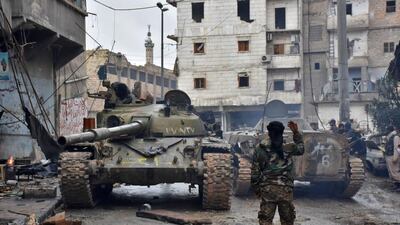BEIRUT// A deal to evacuate fighters and civilians trapped in east Aleppo’s last remaining rebel-held pockets was suspended on Wednesday – just hours after the agreement was hatched.
Transports were set to begin at 5am local time on Wednesday as part of a deal mediated by Russia and Turkey on Tuesday evening. But by Wednesday morning Aleppo was again under fire, with government forces eventually launching air and artillery strikes on the small chunk of territory still controlled by the rebels. Buses sent to evacuate the civilians and fighters turned back as violence returned to the city after a brief pause.
Russia blamed the rebels, saying they had attacked government forces. The rebels, however, blamed Iran for trying to impose its own conditions on the deal and using the militias it backs in Syria to block the evacuation.
After hostilities resumed, Russia claimed Syrian government forces had captured another neighbourhood, Sukkari, shrinking rebel-held territory to a mere 2.5 square kilometres.
With so many armed factions active in Aleppo on both sides – many of them with divergent goals and ambivalent towards deals struck by others – a smooth evacuation was never likely. But the government’s resumption of air and artillery strikes marks a significant escalation and appears to undo much of the careful negotiation that brokered the deal. It also highlights how the Syrian government’s allies on the ground are able to radically manipulate the situation for their own ends.
On Wednesday, Turkey’s state-run Anadolu Agency reported that 1,000 civilians who had departed eastern Aleppo were being held at an Iranian militia checkpoint outside the city, despite being allowed to pass through a Russian checkpoint.
With the plan disintegrating, a media arm of Hizbollah – another key ally of the Syrian government – said that any agreement on Aleppo needed the approval of all sides involved in the conflict, including Iran, with a “comprehensive look at the battlefield and humanitarian developments in other areas”.
Matters were further complicated when Iran and its associated militias in Syria appeared to press for Shiite towns under rebel siege in Idlib province to be evacuated too. Syrian rebels in Idlib responded by shelling Foua and Kefraya, the two besieged villages that Iran wanted to rescue.
Including those villages in the Aleppo evacuation deal would be difficult as it would require even more parties to come to the already crowded negotiating table with even more scope for division.
Any progress made at the 11th hour, with the rebels facing imminent defeat and Aleppo’s civilians in mortal danger, was swept away by Wednesday’s events. No sooner had the rebels agreed to surrender their last redoubt in Aleppo, than Russia was back to discussing military solutions to the conflict in the city.
Russian foreign minister Sergey Lavrov said he expected the rebels would “cease resistance” within the next three days. According to Russia’s state-run Tass news agency, Kremlin spokesperson Dmitry Peskov said the situation in Aleppo was “tense” but there were “positive dynamics” regarding the advance of Syrian troops to “liberate Aleppo from terrorists”.
Despite the latest developments and Moscow’s implacability, Russian president Vladimir Putin and Turkish president Recep Tayyip Erdogan agreed in a phone call on Wednesday to make a joint effort to start the evacuation of civilians and rebels from eastern Aleppo as soon as possible, Turkish presidential sources said. Mr Erdogan told Mr Putin that Turkey was ready to take all possible measures to provide temporary shelter and humanitarian aid following the opening of safe corridors.
In a separate phone call, Mr Lavrov told US secretary of state John Kerry the Syrian government was prepared to provide rebels with safe passage out of Aleppo, but that opposition fighters had refused a ceasefire, according to the Russian foreign ministry.
The United Nations estimated that there were about a quarter of a million civilians in eastern Aleppo’s rebel districts before the government offensive began last month. Russia says more than 110,000 have crossed over into government territory since then. But many have opted to stay for fear of being detained, forcibly conscripted or even executed for their links – whether real or not – to the opposition if they place themselves at the mercy of president Bashar Al Assad’s forces.
For the thousands of civilians still in eastern Aleppo, Tuesday’s evacuation deal offered hope that they might finally escape after enduring three months of total siege and bombardment.
Syrian journalist Zouhir Al Shimale, a contributor to The National based in eastern Aleppo, tweeted in anticipation on Tuesday night: "How am I going to cope with all [the kinds] of food that will be available, as we've been deprived for 3 constant months? But all done :)"
Instead, he and the other civilians remain trapped and under fire, with fewer and fewer places to hide.
jwood@thenational.ae
* With additional reporting from Reuters

